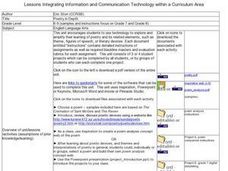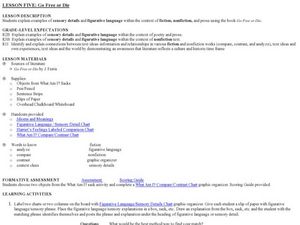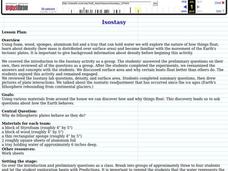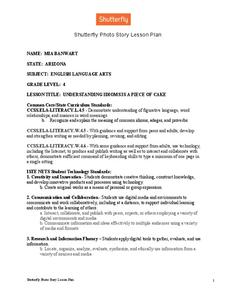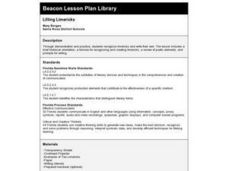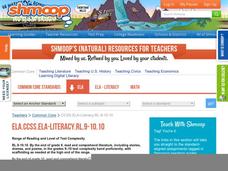BW Walch
“Outsider” Poet Kay Ryan Goes from Poetry Club Reject to Poet Laureate
The cat might have got your tongue, but you can’t avoid the elephant in the room while you wait for the other shoe to drop. After all, the early bird gets the worm and the chickens are circling. After researching Poet Laureate Kay Ryan...
Curated OER
Poetry in Depth
Scholars use technology to explore poetry and its related elements, such as theme, figures of speech, and other literary devices. They complete four poetry projects including a poem analysis with a concept web, an interactive poem...
Curated OER
Go Free or Die: Figurative Language
Figures of speech, sensory details, and academic language are all targeted while reading Chapter Two of J. Ferris’ Go Free or Die. First, learners engage in an exercise to practice describing with detail. Then, partners use a...
Curated OER
Poetry in Motion
Sixth graders answer questions about "From a Railway Carriage." They discuss different poetical forms. They work together to write a poem about travel.
Shutterfly
Photo Story Lesson Plan
After reading Loree Leedy's There's a Frog in My Throat: 440 Animal Sayings a Little Bird Told Me, kids create and illustrate their own poems that convey the meaning of an idiom. The poems are then transferred into Shutterfly's Photo...
Curated OER
Bucket List Poetry
What is on your pupils' "Bucket Lists" - the list of things they want to do before they die? Their choices of activities for this list could be very revealing, and is a great source of inspiration for a personal poem. The lesson prompts...
EngageNY
Analyzing an Author’s Craft: Carlotta’s Journey to Justice
Find your voice. Readers look at a passage from A Mighty Long Way and discuss what it means for Carlotta to find her voice. After discussing figurative language and idioms, learners listen to the song "This Little Light of Mine" and...
Curated OER
Exploring Contrasts in "The Lanyard" by Billy Collins
Middle schoolers analyze the speaker's ideas and tone in the Billy Collins poem "The Lanyard." After identifying how each of the five senses is addressed in the poem, they compare images to draw conclusions about the speaker and his...
Curated OER
Poetry: Simile And Figurative Language
Students explore websites that contain poems about autumn, winter, and the seasonal holidays and explore how similes and figurative language can be used in poetry.
Curated OER
Poetry In Motion
Fourth graders read and analyze poetry and examine the process of writing poetry. They read and analyze the poem "From a Railway Carriage" by Robert Louis Stevenson, and answer comprehension questions. They identify the similes,...
Curated OER
Edward Lear, Limericks, and Nonsense
Introduce your class to the delights of nonsense poetry and explore literary devices with the writing of Edward Lear. Learners identify rhyme and meter as well as figures of speech, alliteration, and onomatopoeia in "The Owl and the...
Curated OER
Simile and Metaphor
Middle schoolers use context clues to find the figurative meaning of similes and metaphors in writing. They practice using figurative language to help their writing come alive. Use this activity in a instructional activity about poetry,...
Curated OER
Idioms
Pupils examine the use of idioms in everyday language. They discuss the meanings of various idioms, complete a worksheet, and create a poster to illustrate a selected idiom.
Curated OER
Over the River and Through the Woods:Prepositional Poetry
Fifth graders will be able to identify and use prepositions correctly in written work.¿¿¿ They will also be able to identify poetic devices.They will see how their writing can be more descriptive and "visual" for their audience.
Curated OER
Poems and Translation (from Spanish to English)
Students read and are read various poems in their native language of Spanish. In groups or individually, they translate the poems into English and practice speaking English by reading them to the class. They answer comprehension...
Curated OER
Figuratively Writing...It's for the Birds!
Students identify and use literary devices such as personification, idioms, hyperbole, and metaphors. They identify one literary device and illustrate the meaning. They write a letter using correct letter format and incorporates literary...
Curated OER
Lilting Limericks
Young scholars discover the formula for writing limericks and use it to write their own poems.
Shmoop
ELA.CCSS.ELA-Literacy.RL.9-10.10
How do you assess what your pupils have learned over the course of the year? Find out how competent they are at reading and analyzing age-level literature with the ideas presented here. Included in this resource are two suggested...
Curated OER
Fall Similes and Metaphors
Pupils interpret what a similies and metaphors are. They give examples of similies and metaphors. Pupils write different similies and metaphors using fall or autumn descriptive words. Students base their comparisons on facts, once they...
Curated OER
Norse Mythology
Third graders read several selections of Norse mythology and compare this mythology to others studied in the past. They are introduced to runes. They read poetry and compile a class book of favorite poems. They define idioms and cite...
Curated OER
Discovering Shoes, Step by Step
Students discuss and write about their interpretations of the art. They compare and contrast the numerous types of shoes and how they are used in a certain time and place. Students memorize the Shel Silverstein's poem, "Ickle Me, Pickle...



